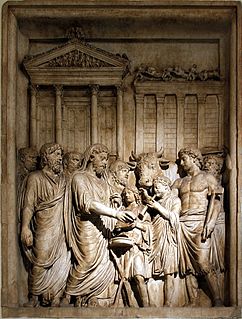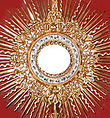
The Eucharist is a Christian rite that is considered a sacrament in most churches, and as an ordinance in others. According to the New Testament, the rite was instituted by Jesus Christ during the Last Supper; giving his disciples bread and wine during the Passover meal, Jesus commanded his followers to "do this in memory of me" while referring to the bread as "my body" and the cup of wine as "the new covenant in my blood". Through the Eucharistic celebration Christians remember both Christ's sacrifice of himself on the cross and his commission of the apostles at the Last Supper.

The Holy Rosary, also known as the Dominican Rosary, refers to a form of prayer used in the Catholic Church and to the string of knots or beads used to count the component prayers. When used for the prayer, the word is usually capitalized, as is customary for other names of prayers, such as "the Lord's Prayer", and "the Hail Mary"; when referring to the beads, it is written with a lower-case initial letter.

Mass is a term used to describe the main eucharistic liturgical service in many forms of Western Christianity. The term Mass is commonly used in the Catholic Church and Anglican churches, as well as some Lutheran churches, Methodist, Western Rite Orthodox and Old Catholic churches.

Sacrifice is the offering of food, objects or the lives of animals or humans to a higher purpose, in particular divine beings, as an act of propitiation or worship. While sacrifice often implies the ritual killing of an animal, the term offering can be used for bloodless sacrifices of food or artifacts. For offerings of liquids (beverages) by pouring, the term libation is used.

Eucharistic adoration is a Eucharistic practice in the Roman Catholic, Anglo-Catholic and some Lutheran traditions, in which the Blessed Sacrament is adored by the faithful. This practice may occur either when the Eucharist is exposed, or when it is not publicly viewable because it is reserved in a place such as a church tabernacle.
The Memorial Acclamation is an acclamation sung or recited by the people after the institution narrative of the Eucharist. They were common in ancient eastern liturgies and have more recently been introduced into Roman Catholic, Anglican, Lutheran, and Methodist liturgies.
Sacerdotalism is the belief that propitiatory sacrifices for sin require the intervention of a priest. This system of priesthood is exemplified by the Aaronic priests in the Old Testament.

The Roman Rite is the most widespread liturgical rite in the Catholic Church, as well as the most popular and widespread Rite in all of Christendom, and is one of the Western/Latin rites used in the Western or Latin Church. The Roman Rite gradually became the predominant rite used by the Western Church. Many local variants, not amounting to distinctive Rites, existed in the medieval manuscripts, but have been progressively reduced since the invention of printing, most notably since the reform of liturgical law in the 16th century at the behest of the Council of Trent (1545–63) and more recently following the Second Vatican Council (1962–65).

Eucharistic theology is a branch of Christian theology which treats doctrines concerning the Holy Eucharist, also commonly known as the Lord's Supper. It exists exclusively in Christianity and related religions, as others generally do not contain a Eucharistic ceremony.
The Year of the Eucharist is the name of the liturgical year from October 2004 to October 2005, as celebrated by Catholics worldwide. On June 10, 2004, Pope John Paul II announced the dedication of an entire year to the Blessed Sacrament and invited the entire Church to reflect upon the Eucharist.
A Eucharistic minister, also known as a communion steward, is an individual that assists in the distribution of Holy Communion to the congregation of a Christian church.

Anglican eucharistic theology is diverse in practice, reflecting the comprehensiveness of Anglicanism. Its sources include prayer book rubrics, writings on sacramental theology by Anglican divines, and the regulations and orientations of ecclesiastical provinces. The principal source material is the Book of Common Prayer, specifically its eucharistic prayers and Article XXVIII of the Thirty-Nine Articles. Article XXVIII comprises the foundational Anglican doctrinal statement about the Eucharist, although its interpretation varies among churches of the Anglican Communion and in different traditions of churchmanship such as Anglo-Catholicism and Evangelical Anglicanism.

The Eucharist in the Catholic Church is a sacrament celebrated as "the source and summit" of the Christian life. The Eucharist is celebrated daily during the celebration of Mass, the eucharistic liturgy. The term Eucharist is also used for the bread and wine when transubstantiated, according to Catholic teaching, into the body and blood of Jesus Christ. "At the Last Supper, on the night he was betrayed, our Saviour instituted the Eucharistic sacrifice of his Body and Blood."
Ecclesia de Eucharistia is an encyclical by Pope John Paul II published on April 17, 2003. Its title, as is customary, is taken from the opening words of the Latin version of the text, which is rendered in the English translation as "The Church draws her life from the Eucharist", with the first words of the Latin translating as "The Church from the Eucharist". He discusses the centrality of the Eucharist to the definition and mission of the Church and says he hopes his message will "effectively help to banish the dark clouds of unacceptable doctrine and practice, so that the Eucharist will continue to shine forth in all its radiant mystery." He explored themes familiar from his earlier writings, including the profound connection between the Eucharist and the priesthood. It drew as well on his personal experiences saying Mass.

In the Catholic Church, liturgy is divine worship, the proclamation of the Gospel, and active charity.

The Mass, known more fully as the Most Holy Sacrifice of the Mass is the central liturgical ritual in the Catholic Church where the bread and wine are consecrated and become the body and blood of Christ. As defined by the Church at the Council of Trent, in the Mass, "The same Christ who offered himself once in a bloody manner on the altar of the cross, is present and offered in an unbloody manner." The Church describes the Holy Mass as "the source and summit of the Christian life". It teaches that through consecration by an ordained priest the bread and wine become the sacrificial body, blood, soul, and divinity of Christ as the sacrifice on Calvary made truly present once again on the altar. The Catholic Church permits only baptised members in the state of grace to receive Christ in the Eucharist.
In persona Christi is a Latin phrase meaning “in the person of Christ”, an important concept in Roman Catholicism and, in varying degrees, to other Christian traditions. A priest is In persona Christi, because he acts as Christ and as God. An extended term, In persona Christi capitis, “in the person of Christ the head,” was introduced in the Catechism of the Catholic Church.
Mysterium Fidei is an encyclical letter of Pope Paul VI on the Eucharist, published in September 1965.

The priesthood is one of the three holy orders of the Catholic Church, comprising the ordained priests or presbyters. The other two orders are the bishops and the deacons. Only men are allowed to receive holy orders, and the church does not allow any transgender people to do so. Church doctrine also sometimes refers to all baptised Catholics as the "common priesthood".
Mediator Dei, a papal encyclical, was issued by Pope Pius XII on 20 November 1947. It was the first encyclical devoted entirely to liturgy. The encyclical suggested new directions and active participation instead of a merely passive role for the faithful in the liturgy, in liturgical ceremonies and in the life of their parish. The encyclical also emphasized the importance of the Eucharist. Mediator Dei is one of the more important encyclicals of Pope Pius XII. The encyclical condemned certain excesses of liturgical reform and stressed the importance of the union of sacrifice and altar with communion, which greatly directed the reforms undertaken during and after Vatican II. It was written in part in response to the liturgical movement under way since early in the 20th century.











